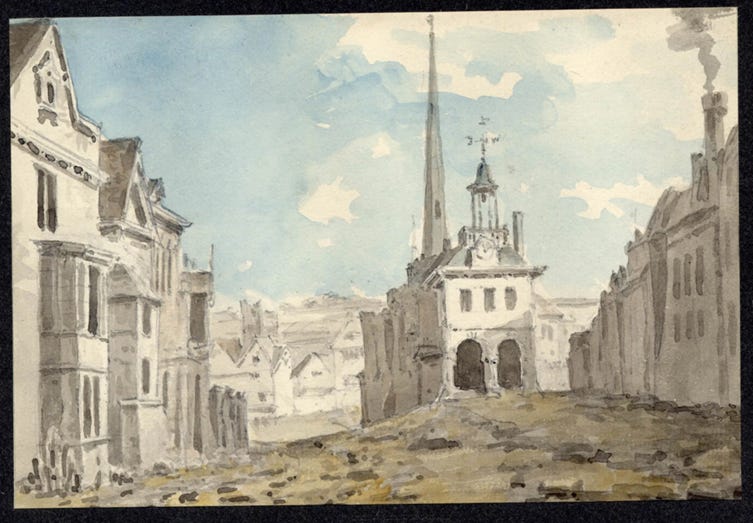50-Day Family History Blogging Challenge - Day 21
Fragments of Family History – Thomas Rose – Origin
Jennifer Jones from TRACKING DOWN THE FAMILY has initiated a 50-Day Family History Blogging Challenge. This is a big writing commitment, but I have decided to participate. I have decided my topic will be “Fragments of Family History”. I will write short posts of newspaper items or single stories connected to my family history. This may expand over the 50 days.
Thomas Rose – Origin
Before I pause writing about my 3x Great Grandfather, Thomas Rose, I need to write about his origin.
Many people believe that Thomas Rose, my 3x Great grandfather, was born in Shropshire because he was caught stealing in Newport, Shropshire and convicted at Shrewsbury, Shropshire. Some of these people state that he was born on 28th Day of the Second Month, 1772 at Coalbrookdale, Shropshire, the son of John and Mary (nee Horton) Rose.1 As this family were Quakers, the second month of the Quaker calendar was actually April. I believe this Thomas Rose was the Thomas Rose who died on 14 of 7th Month (September) 1810 at Birmingham.2 He was 38 years old, of Coalbrookdale, Shropshire, late Cashier to the Coalbrookdale Company and buried 18 of 7th month (September) 1810 at Birmingham in a Quaker burial.
My Thomas was granted an Absolute Pardon on 31 January 1814.3 The Registers of Absolute Pardons states that his native place was Birmingham. He was supposed to be 40 years of age.4 From this his birth can be calculated to be 1773-74. When he died on 3 March 1837, he was 64 years old which means his birth year could be 1772-73.5 He was 19 years old when he was convicted on 19 March 1793 which would mean a birth year of 1773-74.6 Therefore, Thomas Rose was likely born 1772-74. Potential Birmingham Thomas Rose’s and other Shropshire candidates need more research.

Ancestry.com. England & Wales, Quaker Birth, Marriage, and Death Registers, 1578-1837 [database on-line]. Provo, UT, USA: Ancestry.com Operations, Inc., 2013. Original data: General Register Office: Society of Friends' Registers, Notes and Certificates of Births, Marriages and Burials. Records of the General Register Office, Government Social Survey Department, and Office of Population Censuses and Surveys, RG 6. The National Archives, Kew, Richmond, Surrey, England.
FindMyPast, England & Wales, Society of Friends (Quaker) Burials 1578-1841, General Register Office: Society of Friends’ Registers, Notes and Certificates of Births, Marriages and Burials,RG6/241.
Ancestry.com. New South Wales, Australia, Convict Registers of Conditional and Absolute Pardons, 1788-1870 [database on-line]. Provo, UT, USA: Ancestry.com Operations, Inc., 2009. Original data: New South Wales Government. Registers of Absolute Pardons. Series 1177. State Records Reel 800, copy of 4/4486-88. State Records Authority of New South Wales, Kingswood, New South Wales, Australia.
Ancestry.com. New South Wales, Australia, Convict Registers of Conditional and Absolute Pardons, 1788-1870 [database on-line]. Provo, UT, USA: Ancestry.com Operations, Inc., 2009. Original data: New South Wales Government. Registers of Absolute Pardons. Series 1177. State Records Reel 800, copy of 4/4486-88. State Records Authority of New South Wales, Kingswood, New South Wales, Australia.
"Family Notices" The Sydney Gazette and New South Wales Advertiser (NSW : 1803 - 1842) 4 March 1837: 3. Web. 23 Jun 2025 <http://nla.gov.au/nla.news-article2209743>.
Ancestry.com. New South Wales, Australia, Convict Indents, 1788-1842 [database on-line]. Lehi, UT, USA: Ancestry.com Operations, Inc., 2011. This collection was indexed by Ancestry World Archives Project contributors. Original data: New South Wales Government. Bound manuscript indents, 1788–1842. NRS 12188, microfiche 614–619,626–657, 660–695. State Records Authority of New South Wales, Kingswood, New South Wales, Australia.



Great lesson in how to aggregate data to support a hypothesis and direct future research. Pointing out the Quaker calendar was an important point. We can’t always assume the Julian calendar was the one used by ancestors.
I have enjoyed reading all your posts about Thomas Rose. He certainly seems to have packed a lot in to his life.